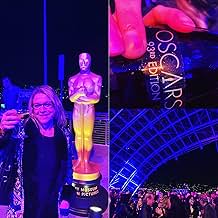Nina Menkes
- Director
- Producer
- Writer
Considered a cinematic feminist pioneer and one of America's foremost independent filmmakers, Menkes has shown widely in major international film festivals including multiple premieres at Sundance, the Berlinale, Cannes, The New York Film Festival, Locarno, Toronto, La Cinematheque Francaise, British Film Institute, Whitney Museum of American Art, MOMA in New York, MOCA and
LACMA in LA.
Nina Menkes synthesizes inner dream-worlds with harsh, outer realities. She has been called "Brilliant, one of the most provocative artists in film today" by the Los Angeles Times and her body of work was described as "controversial, intense and visually stunning" by Sight and Sound. Menkes has referred to herself as a witch, and Dennis Lim, writing in The New York Times, called her a "Cinematic Sorceress".
According to film critic and historian Berenice Reynaud: [Menkes] does not inscribe herself in a recognizable avant-garde tradition, she has no master and no disciples, which forces her to reinvent the history of cinema in her own terms, to struggle alone with formal and conceptual issues. This loneliness - both aesthetic and economic - is also embedded in the texture of the work. Yet, it is not the cliché loneliness of the romantic victim - it is more akin to the 'night of the soul' evoked by the mystics, Dante's travel though a dark wood - or the heroic solitude of the knight-errant."
For many years, Menkes worked closely with her sister Tinka Menkes, who was both her actress and creative collaborator, and Nina credits Tinka for many of the key radical aspects of their work. Menkes was one of the first women to present a feature film at the Sundance Film Festival ("Queen of DIamonds", 1990 in dramatic competition). She has won a Los Angeles Film Critics Association Award for her first feature "Magdalena Viraga", a Guggenheim Fellowship, two Fellowships from the National Endowment for the Arts, an Annenberg Foundation Independent Media Grant, an American Film Institute Independent Filmmaker Award, three Western States Regional Media Arts Fellowships, two Fulbright Research Awards to the Middle East, and a Creative Capital Award. In 2012, The Menkes sisters' feature film "The Bloody Child" was selected as one of the best five films of the past fifty years by the Viennale International Film Festival, in Vienna, Austria.
Menkes, a first generation American, has received two DAAD Artist in Residence in Berlin Awards (1996, 2009). During her residencies in Berlin she tried to face the brutal truth of her family history. Her mother's family were German Jews who fled Hitler's genocide, settling in Jerusalem in 1933; her father's Austrian Jewish family were gassed to death: trauma, alienation and murderous violence are central to her work. In 2002 Menkes shot and co-created a feature length, experimental documentary in Beirut, Lebanon, "Massaker", about the Sabra and Shatila massacre, which premiered at the Berlinale in 2005 and received a FIPRESCI Award.
Menkes's first fiction film without Tinka's participation, "Phantom Love" (2007) premiered at Sundance to rave reviews. The film features Marina Shoif and Juliette Marquis in an unsettling examination of an enmeshed family in crisis. Shot on 35mm black and white film, DP Christopher Soos controlled the lighting with Menkes on camera.
Her Hebrew and Arabic language feature, "Dissolution" (2012), shot in Jaffa, was a collaboration with David Fire, who played the lead role as well as contributed to writing and editing. The film won "Best Drama" at the Jerusalem International Film festival in 2010, and was a New York Times' Critic's Pick, being described as "Exquisite and remarkable".
in 2018-2019 Menkes toured with her cinematic talk "Sex and Power; The Visual Language of Oppression", which was presented at multiple high profile venues including AFI Fest, BFI London, Rotterdam Int'l Film Festival, Cannes, and Sundance. The talk was subsequently made into a feature documentary, entitled "Brainwashed" with support from Executive Producers Tim Disney, Susan Disney Lord and Abigail Disney. "Brainwashed" was selected in 2022 for Sundance, the Berlinale, CPH:DOX, IDFA, Frameline and dozens more international film festivals world-wide. Released by Kino Lorber, "Brainwashed" was named one of the ten best films of 2022 by numerous critics including Film Comment, Roger Ebert, IMDB, Screen Slate and The Association of Women Film Journalists.
Two of Menkes's early feature films, "Queen of Diamonds and "The Bloody Child" , both starring Tinka Menkes, were selected for restoration by the Academy Film Archive and Scorsese's Film Foundation, with funding provided by the Hobson/LucasFamily Foundation. The re-release of "Queen of Diamonds" (Arbelos Film Distribution) was a critical hit, being widely hailed as a modern masterpiece and selected as one the year's top ten films by Artforum magazine.
"The Bloody Child" had its restoration World Premiere at The New York Film Festival 2021, where Head of Programing, Dennis Lim, described Menkes as "One of America's most important filmmakers".
Nina Menkes has an MFA with high honors from the UCLA Film School (1989). She has taught film directing at the USC School of Cinematic Arts, at the Film and Television Institute of India (FTII), and is a faculty member at California Institute of the Arts. She is a directing member of the Academy of Motion Pictures Arts and Sciences (AMPAS). By: Anonymous
Nina Menkes synthesizes inner dream-worlds with harsh, outer realities. She has been called "Brilliant, one of the most provocative artists in film today" by the Los Angeles Times and her body of work was described as "controversial, intense and visually stunning" by Sight and Sound. Menkes has referred to herself as a witch, and Dennis Lim, writing in The New York Times, called her a "Cinematic Sorceress".
According to film critic and historian Berenice Reynaud: [Menkes] does not inscribe herself in a recognizable avant-garde tradition, she has no master and no disciples, which forces her to reinvent the history of cinema in her own terms, to struggle alone with formal and conceptual issues. This loneliness - both aesthetic and economic - is also embedded in the texture of the work. Yet, it is not the cliché loneliness of the romantic victim - it is more akin to the 'night of the soul' evoked by the mystics, Dante's travel though a dark wood - or the heroic solitude of the knight-errant."
For many years, Menkes worked closely with her sister Tinka Menkes, who was both her actress and creative collaborator, and Nina credits Tinka for many of the key radical aspects of their work. Menkes was one of the first women to present a feature film at the Sundance Film Festival ("Queen of DIamonds", 1990 in dramatic competition). She has won a Los Angeles Film Critics Association Award for her first feature "Magdalena Viraga", a Guggenheim Fellowship, two Fellowships from the National Endowment for the Arts, an Annenberg Foundation Independent Media Grant, an American Film Institute Independent Filmmaker Award, three Western States Regional Media Arts Fellowships, two Fulbright Research Awards to the Middle East, and a Creative Capital Award. In 2012, The Menkes sisters' feature film "The Bloody Child" was selected as one of the best five films of the past fifty years by the Viennale International Film Festival, in Vienna, Austria.
Menkes, a first generation American, has received two DAAD Artist in Residence in Berlin Awards (1996, 2009). During her residencies in Berlin she tried to face the brutal truth of her family history. Her mother's family were German Jews who fled Hitler's genocide, settling in Jerusalem in 1933; her father's Austrian Jewish family were gassed to death: trauma, alienation and murderous violence are central to her work. In 2002 Menkes shot and co-created a feature length, experimental documentary in Beirut, Lebanon, "Massaker", about the Sabra and Shatila massacre, which premiered at the Berlinale in 2005 and received a FIPRESCI Award.
Menkes's first fiction film without Tinka's participation, "Phantom Love" (2007) premiered at Sundance to rave reviews. The film features Marina Shoif and Juliette Marquis in an unsettling examination of an enmeshed family in crisis. Shot on 35mm black and white film, DP Christopher Soos controlled the lighting with Menkes on camera.
Her Hebrew and Arabic language feature, "Dissolution" (2012), shot in Jaffa, was a collaboration with David Fire, who played the lead role as well as contributed to writing and editing. The film won "Best Drama" at the Jerusalem International Film festival in 2010, and was a New York Times' Critic's Pick, being described as "Exquisite and remarkable".
in 2018-2019 Menkes toured with her cinematic talk "Sex and Power; The Visual Language of Oppression", which was presented at multiple high profile venues including AFI Fest, BFI London, Rotterdam Int'l Film Festival, Cannes, and Sundance. The talk was subsequently made into a feature documentary, entitled "Brainwashed" with support from Executive Producers Tim Disney, Susan Disney Lord and Abigail Disney. "Brainwashed" was selected in 2022 for Sundance, the Berlinale, CPH:DOX, IDFA, Frameline and dozens more international film festivals world-wide. Released by Kino Lorber, "Brainwashed" was named one of the ten best films of 2022 by numerous critics including Film Comment, Roger Ebert, IMDB, Screen Slate and The Association of Women Film Journalists.
Two of Menkes's early feature films, "Queen of Diamonds and "The Bloody Child" , both starring Tinka Menkes, were selected for restoration by the Academy Film Archive and Scorsese's Film Foundation, with funding provided by the Hobson/LucasFamily Foundation. The re-release of "Queen of Diamonds" (Arbelos Film Distribution) was a critical hit, being widely hailed as a modern masterpiece and selected as one the year's top ten films by Artforum magazine.
"The Bloody Child" had its restoration World Premiere at The New York Film Festival 2021, where Head of Programing, Dennis Lim, described Menkes as "One of America's most important filmmakers".
Nina Menkes has an MFA with high honors from the UCLA Film School (1989). She has taught film directing at the USC School of Cinematic Arts, at the Film and Television Institute of India (FTII), and is a faculty member at California Institute of the Arts. She is a directing member of the Academy of Motion Pictures Arts and Sciences (AMPAS). By: Anonymous


















